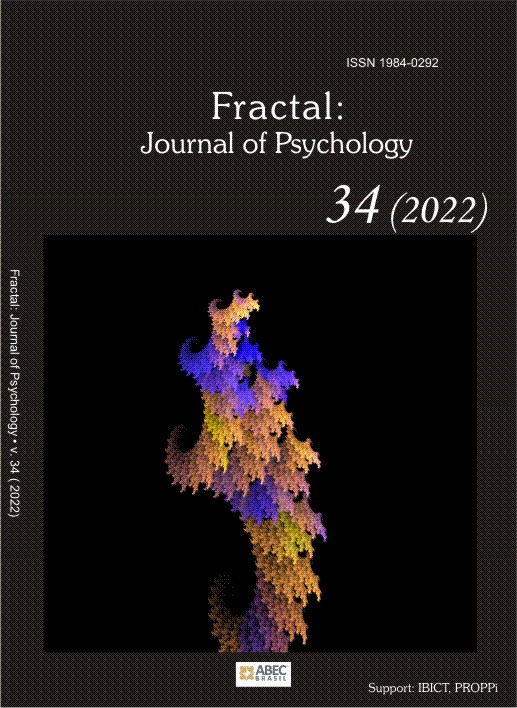Spinoza and clinical practices in psychology: some considerations
DOI:
https://doi.org/10.22409/1984-0292/2022/v34/28197Keywords:
Spinoza, clinical practices, modes of subjectivation, contemporaryAbstract
This theoretical essay intends to list some questions about the possible Spinoza’s contributions to the understanding of the modes of subjectivation and, consequently, to the clinical practices of Psychology today. Initially, in line with scholars and commentators, the actuality of Spinoza’s work will be placed even nearly four centuries after his death. In explaining the main concepts of the author, it also proposes to draw an introductory panorama, to those interested in a first contact with this work. Due to the innovative and transformative character of his work, it is necessary to explain the set of concepts, since one concept promotes a change in another and so on. In this course, we will highlight the concept of the multitude, which resizes the importance of collective formations of desire, to indicate the ethical and political revolution wrought by its philosophy. With this movement we then come to the heart of his work with the concepts of affection and body, closely related. Finally, we will make a brief reflection on some forms of suffering present in the contemporary, pointing out the particularities of certain aspects of psychology, based on dualisms, to propose intervention strategies guided by Spinozist inspiration.
Downloads
References
CHAUÍ, Marilena. Spinoza: vida e obra. In: SPINOZA, Benedictus de. Obras completas. 3. ed. São Paulo: Abril Cultural, 1983. Coleção Os Pensadores.
DELEUZE, Gilles. Espinosa e a filosofia prática. (1970). Trad. Daniel Lins e Fabien Pascal Lins. São Paulo: Escuta, 2002.
FREIRE FILHO, João. Introdução. In: ______. (Org.). Ser feliz hoje: reflexões sobre o imperativo da felicidade. Rio de Janeiro: FGV, 2010. p. 10-19.
GOLLIAU, Catherine. Un homme très discret. Le Point. Hors série: les maîtres-penseurs. Paris, n. 19, p. 9-11, out./nov. 2015.
JAQUET, Chantal. Depassioner les passions. Le Point. Hors série: les maîtres-penseurs. Paris, n. 19, p. 57-58, out./nov. 2015.
LO BIANCO, Anna Carolina et al. Concepções e atividades emergentes na psicologia clínica: implicações para a formação. In: ACHCAR, Rosemary (Coord.) Psicólogo brasileiro: práticas emergentes e desafios para a formação – Conselho Federal de Psicologia. São Paulo: Casa do Psicólogo, 1994. p. 7-79.
LORDON, Frédéric. Imperium: structures et affects des corps politiques. Paris: La Fabrique, 2015.
MOREAU, Pierre-François. Une pensée révolutionnare. Le Point. Hors série: les maîtres-penseurs. Paris, n. 19, p. 41-42, out./nov. 2015.
RAUTER, Cristina Mair. O negativo como obstáculo a uma compreensão da violência contemporânea: criminalidade e coletivo. Cadernos de Psicanálise – CPRJ, Rio de Janeiro, v. 33, n. 24, p. 78-90, 2011.
RAUTER, Cristina. Clínica transdisciplinar: afirmação da multiplicidade em Deleuze/Spinoza. Revista Trágica: estudos de filosofia da imanência, Rio de Janeiro, v. 8, n. 1, p. 45-56, jan./abr. 2015. Disponível em: https://revistas.ufrj.br/index.php/tragica/article/view/26802. Acesso em: 12 out. 2020.
SÉVÉRAC, Pascal. Conhecimento e afetividade em Espinosa. In: MARTINS, André. O mais potente dos afetos: Spinoza e Nietzsche. São Paulo: Martins Fontes, 2009.
SÉVÉRAC, Pascal. Le corps, matière à penser. Le Point. Hors série: les maîtres-penseurs. Paris, n. 19, p. 55-56, out./nov. 2015.
SIBILIA, Paula. Em busca da felicidade lipoaspirada: agruras da imperfeição carnal sob a moral da boa forma. In: FREIRE FILHO, João (Org.). Ser feliz hoje: reflexões sobre o imperativo da felicidade. Rio de Janeiro: FGV, 2010. p. 195-212.
SPINOZA, Baruch de. Tratado político. Trad. Diogo Pires Aurélio. São Paulo: WMF Martins Fontes, 2009.
SPINOZA, Baruch de. Ética. Trad. Thomaz Tadeu. Belo Horizonte: Autêntica, 2011.
SUHAMY, Ariel. Prècis de vocabulaire spinoziste. Le Point. Hors série: les maîtres-penseurs. Paris, n. 19, p. 43-46, out./nov. 2015.
TEIXEIRA, Anelise Lusser. Morte e morrimentos: cartografando os (a[mor)te]cimentos do viver. 2016. 183f. Tese (Doutorado em Psicologia) – Universidade Federal Fluminense, Niterói, 2016. Disponível em: https://app.uff.br/slab/uploads/2016_t_Anelise_06_10_2016.pdf. Acesso em: 22 fev. 2017.
TERUEL, Ana. Movimento dos indignados ganha força na França. El País Brasil. 9 abr. 2016. Disponível em: https://brasil.elpais.com/brasil/2016/04/08/internacional/1460121318_926332.html. Acesso em: 15 maio 2016.
VINCIGUERRA, Lorenzo. Spinoza et le mal d’etenité. Fortitude et servitude: Lectures de l’Ethique IV de Spinoza. Paris: Kimé, 2003. p. 163-182.
Published
How to Cite
Issue
Section
License
Copyright (c) 2022 Fractal: Revista de Psicologia

This work is licensed under a Creative Commons Attribution 4.0 International License.
Authors publishing in this journal agree to the following terms:
- Authors retain copyright and grant the journal the right of first publication, with the work simultaneously licensed under the Creative Commons Attribution License allowing sharing of the work with acknowledgement of authorship of the work and initial publication in this journal.
- Authors are permitted to enter into additional contracts separately for non-exclusive distribution of the version of the work published in this journal (e.g., publishing in an institutional repository or as a book chapter), with acknowledgment of authorship and initial publication in this journal.

This work is licensed under a Creative Commons Attribution 4.0 International License.
To the extent possible under the law, Fractal: Journal of Psychology has waived all copyright and related rights to the Reference Lists in research articles. This work is published in: Brazil.
To the extent possible under law,Fractal: Journal of Psychology has waived all copyright and related or neighboring rights to Reference lists in research articles. This work is published from: Brazil.







